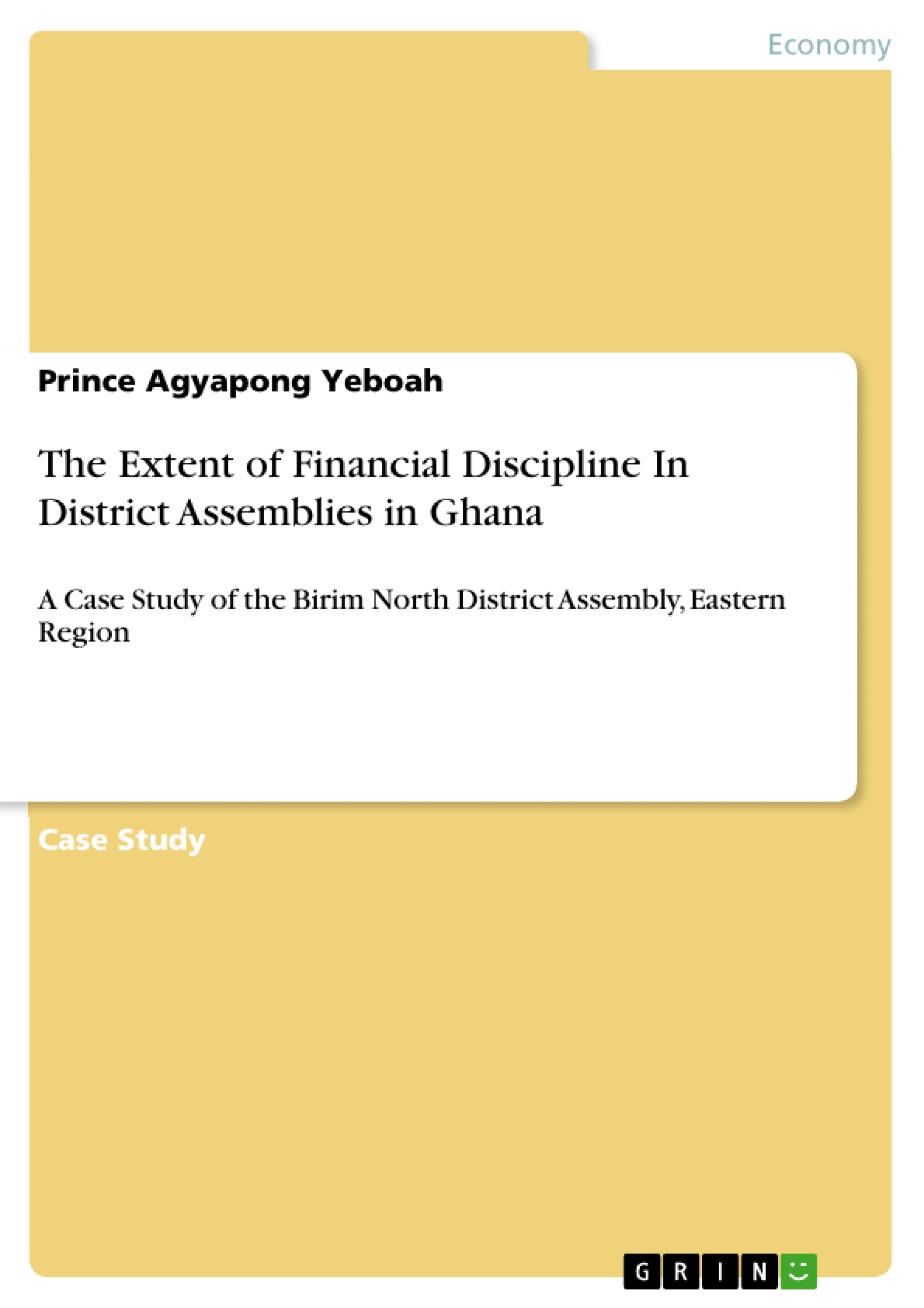Decentralization is a mechanism for bringing governance closer to the governed and helps to improve public administration by empowering local authorities, thereby enhancing the capacity of government to achieve local participation and accelerated development through financial sanity. Section 240(2) (c) of the Local Government Act of Ghana provides that each district assembly shall have a sound financial base with adequate and reliable sources of revenue, hence making them financially accountable to the people they serve.
Despite this requirement, many Metropolitan/Municipal/District Assemblies have a limited number of sources of revenue for carrying out their activities. Apart from the District Assemblies Common Fund (DACF), which is 7% of total national tax revenue, the assemblies can also receive grants, land rates, mineral royalties, transfer, ceded revenues and external credits. The use of these monies is expected to conform to the Ministry of Finance and Economic Planning requirements. It is a requirement that, all monies are released at the assembly level by a warrant. This research examined the extent to which financial discipline was concerned within the Birim North District Assembly. It was found that not all monies paid were on the authority of the warrant.
They are also expected to engage in activities that can generate revenues, (Internally Generated Fund, IGF) to be used for their administrative and other recurrent operations. However, many of them lack the capacity to develop revenue generating activities while others are unable to generate sufficient revenue internally because of the deprived circumstance of their districts. The researcher also found out that there were a lot of loopholes in the management of finances in the Local Government Service if the case of the Birim North District Assembly is anything to go by, only by the assumption that, this accession is not a hasty generalization. This research envisages providing baseline contribution to sound financial management within the district assemblies of Ghana.
Table of Contents
- INTRODUCTION
- MATERIALS AND METHODS
- RESULTS
- DISCUSSIONS
- CONCLUSION
- REFERENCES
Objectives and Key Themes
This research examines the financial discipline within Ghana's Birim North District Assembly, focusing on whether funds are managed effectively and used for their intended purpose. It investigates the extent of community involvement in budgeting, the effectiveness of internal controls, community awareness of government transfers, and the conformity of accounting systems with regulations. The study aims to provide baseline data for improving financial management in Ghanaian district assemblies and inform policy adjustments at both the local and national levels.
- Financial Management in Ghana's District Assemblies
- Effectiveness of Internal Control Systems
- Community Involvement in Budgeting and Resource Allocation
- Conformity of Accounting Practices with Regulations
- Impact of Decentralization on Local Development
Chapter Summaries
INTRODUCTION: This chapter introduces the concept of decentralization in Ghana and its intended role in improving public administration and local development. It highlights the importance of sound financial management for district assemblies, emphasizing their reliance on various revenue sources including the District Assemblies Common Fund (DACF), internally generated funds (IGF), and other grants. The chapter establishes the research problem by outlining existing perceptions of financial mismanagement within district assemblies and the need for a comprehensive investigation into the financial practices of the Birim North District Assembly. It also outlines the research objectives, emphasizing the study's contribution to enhancing local-level development and informing policy adjustments.
Keywords
Decentralization, District Assemblies' Common Fund, Internally Generated Funds, Revenue Generation, Warrant, District Development Facility, Financial Management, Local Governance, Ghana.
Ghana's Birim North District Assembly: Financial Management and Decentralization - FAQ
What is the main focus of this research?
This research examines the financial discipline within Ghana's Birim North District Assembly. It investigates the effectiveness of fund management, community involvement in budgeting, internal controls, community awareness of government transfers, and the conformity of accounting systems with regulations. The goal is to provide data for improving financial management and inform policy adjustments.
What are the key themes explored in this research?
Key themes include financial management in Ghana's district assemblies, the effectiveness of internal control systems, community involvement in budgeting and resource allocation, conformity of accounting practices with regulations, and the impact of decentralization on local development.
What are the objectives of this study?
The study aims to provide baseline data for improving financial management in Ghanaian district assemblies and to inform policy adjustments at both the local and national levels. It seeks to understand how effectively funds are managed and used for their intended purpose within the Birim North District Assembly.
What are the key chapters covered in the research?
The research includes an introduction, materials and methods, results, discussion, conclusion, and references. The introduction sets the stage by discussing decentralization in Ghana and its impact on public administration. The other chapters delve into the methodology, findings, analysis, and implications of the research.
What is the significance of the District Assemblies Common Fund (DACF) and Internally Generated Funds (IGF)?
The research highlights the reliance of district assemblies on various revenue sources, including the DACF and IGF, to understand their financial sustainability and resource management practices.
What is the role of community involvement in this research?
The research investigates the extent of community involvement in budgeting and resource allocation, recognizing the importance of local participation in effective financial management.
What are the key words associated with this research?
Key words include Decentralization, District Assemblies' Common Fund (DACF), Internally Generated Funds (IGF), Revenue Generation, Warrant, District Development Facility, Financial Management, Local Governance, and Ghana.
What is the overall goal of this research?
The overarching goal is to contribute to enhancing local-level development and informing policy adjustments by providing a comprehensive analysis of financial management practices within the Birim North District Assembly.
- Arbeit zitieren
- Prince Agyapong Yeboah (Autor:in), 2014, The Extent of Financial Discipline In District Assemblies in Ghana, München, GRIN Verlag, https://www.grin.com/document/354397



